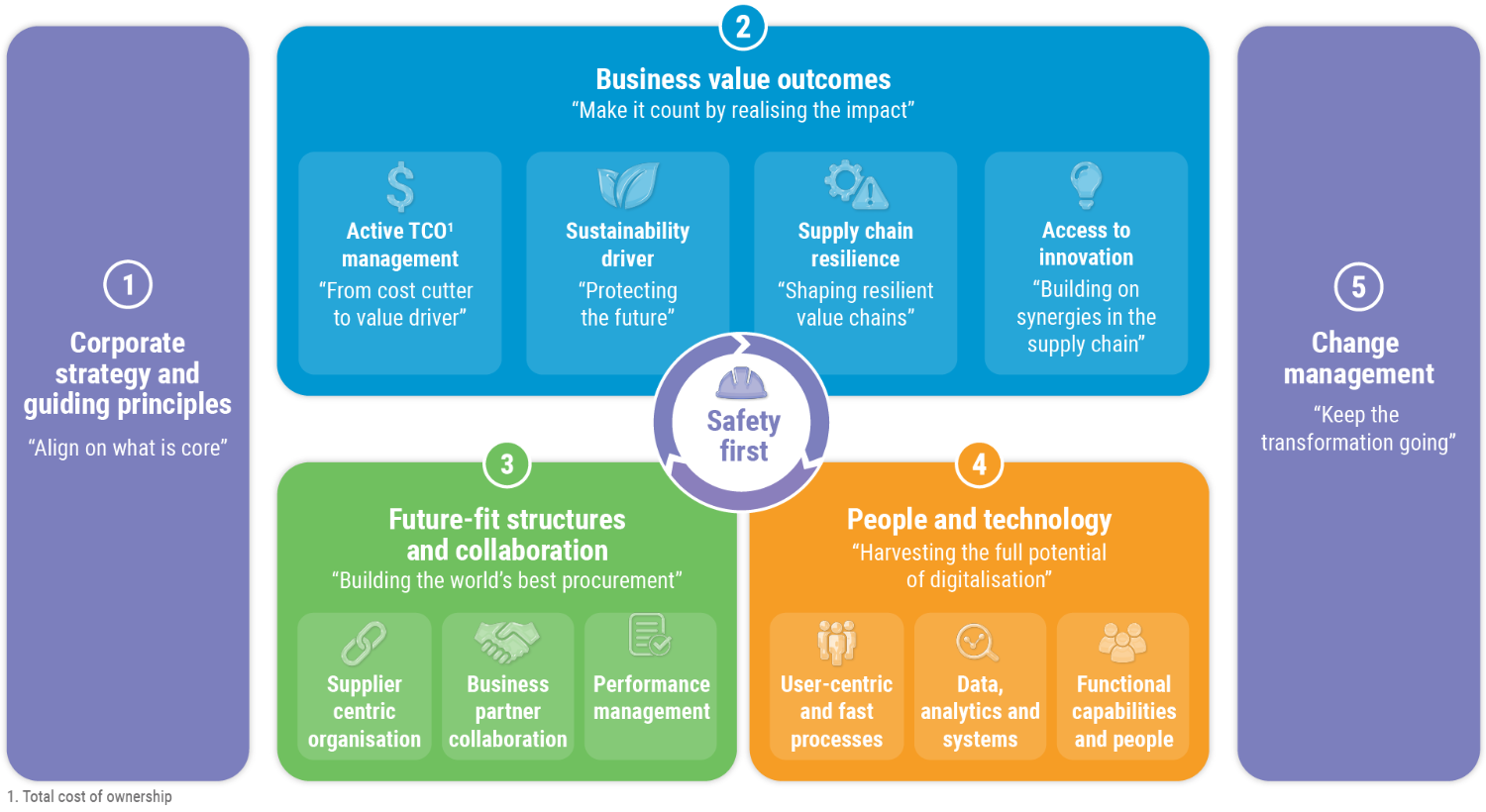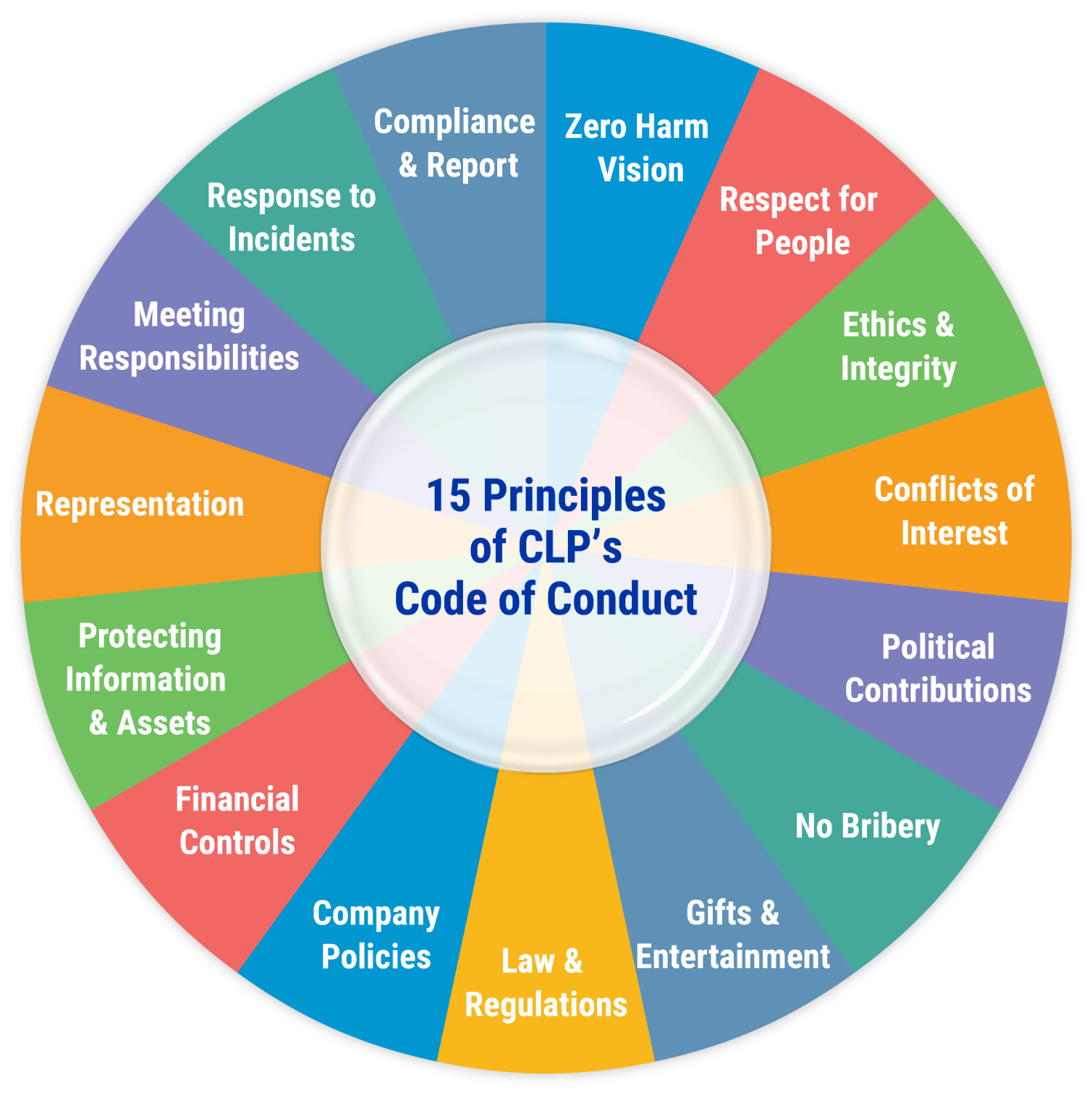CLP's effective procurement and supply chain management system cultivates long-term and mutually beneficial relationships with suppliers who share our values and goals. The system is centred on the CLP Group Procurement Standard (GPS) which is supported by a set of policies.
The system aims to continually improve CLP's competitive advantage by forming commercially viable strategic relationships with its preferred suppliers. The approach measures business value outcomes in terms of the total cost of ownership management, environmental, social and governance (ESG) value, supply chain resilience, and innovation. As an integral part of the business operation, CLP’s procurement commitments are also embedded in a set of policies including CLP's Value Framework, CLP Procurement Values and Principles, CLP SCoC and other procurement policies that govern daily CLP operations.
Strategies and procedures
The GPS provides a framework towards world-class procurement practice and for raising CLP’s supply chain management capability to support CLP's transition to a Utility of the Future.
The GPS provides a structured path for the business to deliver value outcomes in the four critical areas of total cost of ownership management, sustainability, upstream supply chain resilience and innovation. It is regularly reviewed through internal engagement for continuous improvement.
The latest version of the GPS was released in early 2022 with safety within the supply chain serving as an overarching value for the five-dimensional framework. The five dimensions of the GPS are:
For each dimension, the GPS defines levels of world-class practice from “basic” to “advanced”. Each business unit assesses their required level of functional capability to support their business outcomes, and then develops a plan from their current level of practice towards leading practices.
CLP's Group Procurement Standard

CLP’s Whistleblowing Policy and Harassment-Free Workplace Policy also enhance CLP's procurement operations and CLP encourages all suppliers to uphold the principles outlined in these policies.
CLP Procurement team is a member of project steering committees and provides appropriate levels of oversight and governance in procurement decision-making. Procurement commitments in the Company’s various regions are made with reference to the clearly-defined authorities set out in the Company Management Authority Manuals.
Monitoring and follow-up
CLP’s fit-for-purpose sourcing strategies are designed to select suppliers who will best meet its requirements and deliver value at an acceptable level of risk.
Following the standard procedure, supplier selections are conducted through competitive tendering which assesses each supplier’s ability to fulfil quality, health and safety, environment, delivery, innovation, sustainability and cost criteria. In every supplier contract, CLP safeguards its stakeholder interests and ensures the supplier meets its commitments and obligations, including legal and regulatory compliance, and obligations in respect of intellectual property rights, data confidentiality and security.
The Procurement Leadership Team, comprising each Region’s head of procurement, oversees aggregated future procurement needs, supply market opportunities and risks, and the development of procurement strategies.
Procurement and business unit personnel work collaboratively to review the market and assess the performance of incumbent suppliers, as well as monitor sustainability risks in the areas of human rights/modern day slavery, environment and community. This joint effort has improved CLP’s ability to formulate effective sourcing strategies, negotiate and manage risk and supplier relationships, and has resulted in tangible commercial benefits for each business.
For better management of supplier clusters, CLP segments its contracted suppliers into tiers based on relative contract value and potential business impact, including risks in relation to supply chain and sustainability. The tiers are reviewed on an annual basis. The process of segmentation allows CLP to apply appropriate levels of governance and engagement for efficient supply chain management.
In addition, quarterly risk assessments are conducted according to the Corporate Risk Framework for strategic suppliers with high business criticality and spend value. Heatmaps assist in determining the likelihood of failure events and their potential impact on the business. The assessment is conducted in conjunction with supplier risk management and supplier relationship management processes. Risk mitigation plans are developed to address identified risks related to delivery performance, supply disruptions and business continuity, and sustainability along the supply chain. Regular meetings with suppliers are conducted to discuss the progress of mitigation plans and explore opportunities for further improvement.
Continuous improvement
Through year-round operational, business, and executive reviews, CLP enhances its supplier relationship management process for strategic suppliers. The reviews consistently measure each strategic supplier’s delivery performance, and drive continuous improvements and alignment.
Past performance data, future business needs, and technology and innovation roadmaps are regularly reviewed with suppliers. While supplier performance is measured under a structured framework, suppliers are also invited to provide feedback to CLP. This approach provides candid two-way communication and continuous improvements in the long run. Supplier input, with specific focus on technology roadmaps and innovation, also strengthens CLP in preparing for future challenges.
For example, as a result of the review process, a talent development programme has been rolled out in CLP Power since 2021. It provides comprehensive training modules, including topics on category management and sustainable procurement, to uplift the capabilities of the procurement team in Hong Kong. Additional sustainability training on sustainable supply chain and other related topics will be arranged in 2023.










